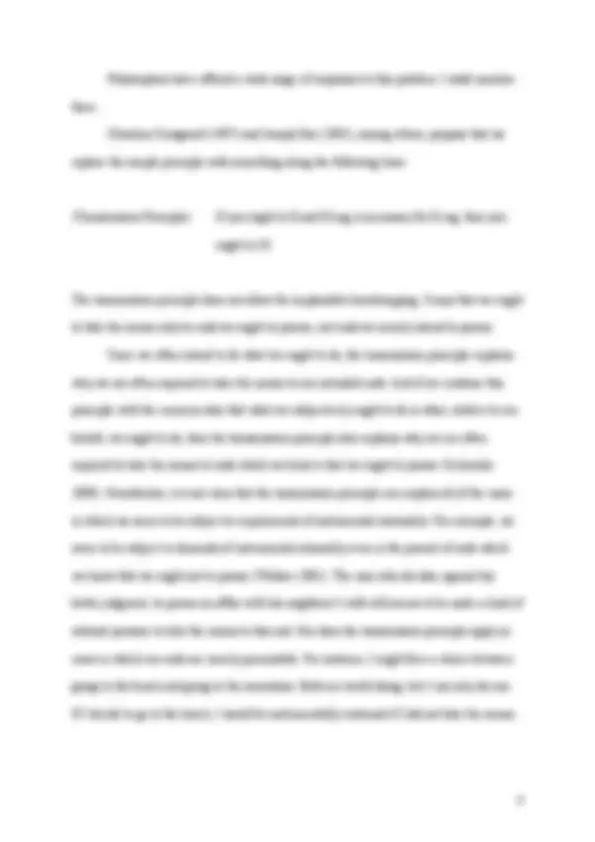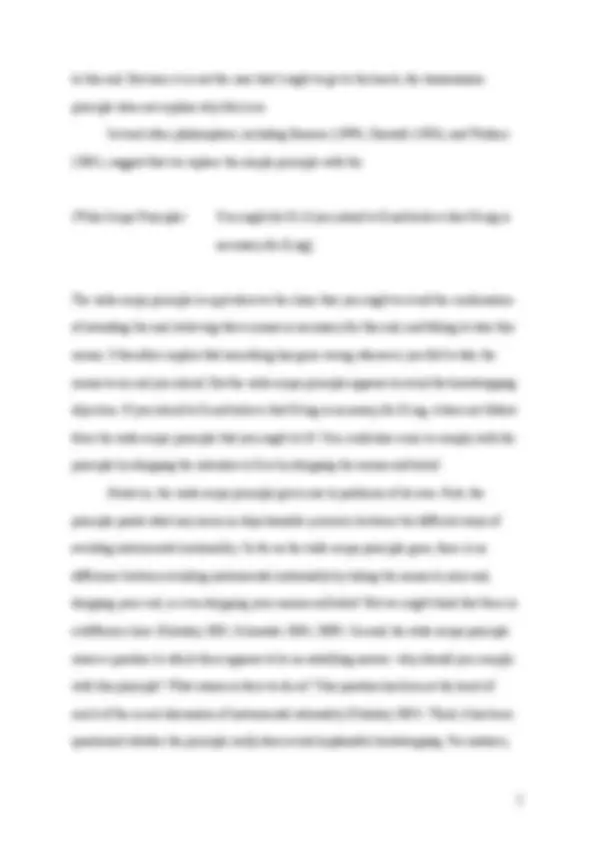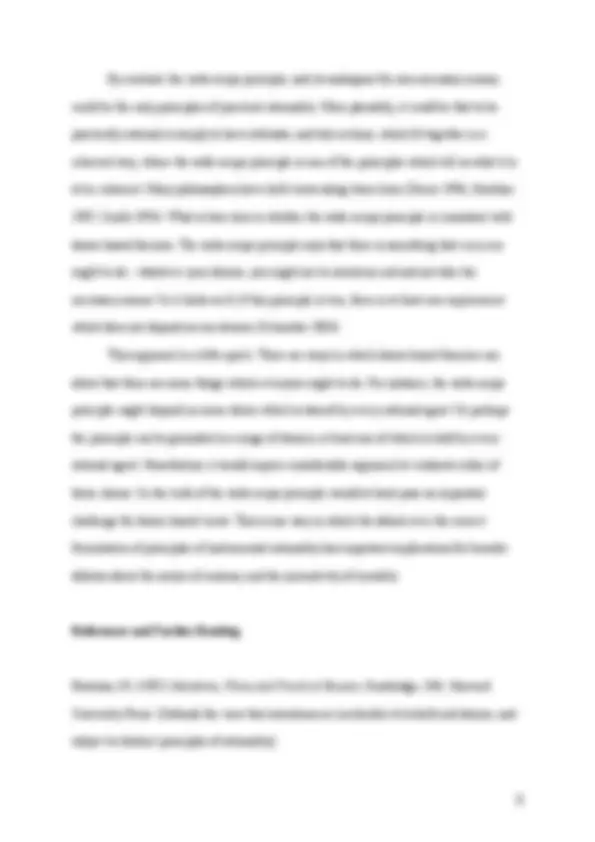








Study with the several resources on Docsity

Earn points by helping other students or get them with a premium plan


Prepare for your exams
Study with the several resources on Docsity

Earn points to download
Earn points by helping other students or get them with a premium plan
Community
Ask the community for help and clear up your study doubts
Discover the best universities in your country according to Docsity users
Free resources
Download our free guides on studying techniques, anxiety management strategies, and thesis advice from Docsity tutors
The concept of instrumental rationality, which refers to taking necessary and effective means to achieve our ends. various perspectives on the principles of instrumental rationality and its relationship with other forms of rationality. Questions addressed include which ends are relevant to instrumental rationality and how to choose the best means to achieve desired ends. The document also touches upon the debate of whether instrumental rationality could be all of practical rationality.
Typology: Slides
1 / 10

This page cannot be seen from the preview
Don't miss anything!







Instrumental Rationality For the Routledge Encyclopedia of Philosophy Jonathan Way University of Southampton We are instrumentally rational when we take necessary and effective means to our ends, and instrumentally irrational when we fail to do so. For instance, if you decide to give up smoking, it would be rational to stop buying cigarettes, and to limit the time you spend around other smokers. It would be irrational not to take any means to this end. It is not clear how to formulate the principles of instrumental rationality. It is natural to think that if you have an end, you ought to take the means to that end. But if it would be wicked or crazy to take the means to one of your ends, then you ought not to take this means. In recent years, there has been considerable discussion of what to say about this issue. It is often suggested that instrumental rationality might be all of practical rationality – that to be rational in respect of one’s actions is just to be instrumentally rational. This view has serious implications for the normativity of morality, since it suggests that it is not always rational to be moral. Some philosophers suggest that a proper understanding of instrumental rationality shows that we should reject this view.
1. What is Instrumental Rationality? At least part of what it is to be practically rational – rational in our actions and decisions – is to be instrumentally rational – to take necessary and effective means to our ends (see
Rationality, Practical). There are many important questions about the principles of instrumental rationality, and about the relationship between instrumental rationality and other forms of rationality. But before we can consider these questions, it will be helpful to get a clearer sense of the topic. In particular, we should ask: which of our ends are relevant to instrumental rationality? And which means are relevant? The traditional answer to the first question is that our ends are the objects of our desires. On this view, instrumental rationality is a matter of maximising the satisfaction of our desires, or preferences. Expected utility theory is often understood as a way of developing this idea (Gauthier 1987, Dreier 1996; and see Rationality, Practical, §§1, 3, and 4). However, in recent years, many discussions of instrumental rationality have focussed on a different, although not incompatible, answer to this question. On this view, it is our intentions which are most directly relevant to instrumental rationality. This view begins by noting that it is not necessarily irrational to fail to take the means to ends you merely desire. If you want to finish working on your paper tonight, and also want to see the movie which is playing for the last time, then you will inevitably fail to take the means to one of your desired ends. But it does not follow that you are thereby irrational. There is nothing wrong with having inconsistent desires. By contrast, it does seem irrational to fail to take the means to working on your paper if that is what you intend to do. And it would be irrational for you to intend both to work on your paper and to see the movie (Harman 1976, Bratman 198 7 ; and see Intention). Turning now to the second question, the first thing to observe is that there are typically a wide-range of means to each of our ends. For instance, there are many ways to achieve the end of having a pleasant evening, or of getting from London to Paris. It is clear enough that instrumental rationality does not require us to take all of these means. And instrumental rationality does require us to take any necessary means and (so) some sufficient means. But beyond this, things get rather less clear. Often, it is irrational to fail to take the
Philosophers have offered a wide range of responses to this problem. I shall mention three. Christine Korsgaard (1997) and Joseph Raz (2005), among others, propose that we replace the simple principle with something along the following lines: (Transmission Principle) If you ought to E and M-ing is necessary for E-ing, then you ought to M. The transmission principle does not allow for implausible bootstrapping. It says that we ought to take the means only to ends we ought to pursue, not ends we merely intend to pursue. Since we often intend to do what we ought to do, the transmission principle explains why we are often required to take the means to our intended ends. And if we combine this principle with the common idea that what we subjectively ought to do is what, relative to our beliefs, we ought to do, then the transmission principle also explains why we are often required to take the means to ends which we believe that we ought to pursue (Schroeder 2009). Nonetheless, it is not clear that the transmission principle can explain all of the cases in which we seem to be subject to requirements of instrumental rationality. For example, we seem to be subject to demands of instrumental rationality even in the pursuit of ends which we know that we ought not to pursue (Wallace 2001). The man who decides, against his better judgment, to pursue an affair with his neighbour’s wife still seems to be under a kind of rational pressure to take the means to this end. Nor does the transmission principle apply in cases in which our ends are merely permissible. For instance, I might face a choice between going to the beach and going to the mountains. Both are worth doing, but I can only do one. If I decide to go to the beach, I would be instrumentally irrational if I did not take the means
to this end. But since it is not the case that I ought to go to the beach, the transmission principle does not explain why this is so. Several other philosophers, including Broome (1 9 99), Darwall (1983), and Wallace (2001), suggest that we replace the simple principle with the (Wide-Scope Principle) You ought [to M, if you intend to E and believe that M-ing is necessary for E-ing]. The wide-scope principle is equivalent to the claim that you ought to avoid the combination of intending the end, believing that a means is necessary for this end, and failing to take this means. It therefore implies that something has gone wrong whenever you fail to take the means to an end you intend. But the wide-scope principle appears to avoid the bootstrapping objection. If you intend to E and believe that M-ing is necessary for E-ing, it does not follow from the wide-scope principle that you ought to M. You could also come to comply with the principle by dropping the intention to E or by dropping the means-end belief. However, the wide-scope principle gives rise to problems of its own. First, the principle posits what may seem an objectionable symmetry between the different ways of avoiding instrumental irrationality. So far as the wide-scope principle goes, there is no difference between avoiding instrumental irrationality by taking the means to your end, dropping your end, or even dropping your means-end belief. But we might think that there is a difference here (Kolodny 2005, Schroeder 2004, 2009). Second, the wide-scope principle raises a question to which there appears to be no satisfying answer: why should you comply with this principle? What reason is there to do so? This question has been at the heart of much of the recent discussion of instrumental rationality (Kolodny 2005). Third, it has been questioned whether the principle really does avoid implausible bootstrapping. For instance,
moral is not a good means to one’s ends, it seems to follow that it is not always rational to be moral. There is a vast literature on this issue (see Practical Reason and Ethics). Here I focus on the claim, sometimes made in connection with the transmission and wide-scope principles, that a correct understanding of instrumental rationality reveals that instrumental rationality could not be all of practical rationality. The claim that instrumental rationality is all of practical rationality can be understood in at least two ways. On one understanding, it is to say that the principles of instrumental rationality are the only principles of practical rationality. We can call this view instrumentalism. On another understanding, it is to say that what one has reason to do essentially depends on what one’s desires are. We can call this the desire-based view. Both of these views take inspiration from Hume’s famous claim that ‘reason is and ought only to be the slave of the passions’ (see Hume, David 1711-76, §10). However, it is crucial to distinguish these views. Consider the transmission principle. Since this principle says that there is a reason for the means only if there is reason for the end, it is clear that this could not be the only principle of practical rationality. So instrumentalists cannot endorse the transmission principle (Korsgaard 1997). However, the transmission principle is perfectly consistent with desire-based views, since desire-based views need not deny that there can be reasons for final ends. For instance, proponents of desire-based views may hold that wanting to do something for its own sake gives you a reason to do that very thing (Hubin 1999). Or they may claim that wanting something as an end gives you a reason to want other things as ends. For instance, wanting pleasure as an end may give you a reason to desire friendship as an end, since wanting friendship as an end is itself a means to pleasure (Harman 1976, Schroeder 2007).
By contrast, the wide-scope principle, and its analogues for non-necessary means, could be the only principles of practical rationality. More plausibly, it could be that to be practically rational is simply to have attitudes, and take actions, which fit together in a coherent way, where the wide-scope principle is one of the principles which tell us what it is to be coherent. Many philosophers have held views along these lines (Dreier 1996 , Gauthier 1987, Smith 1994 ). What is less clear is whether the wide-scope principle is consistent with desire-based theories. The wide-scope principle says that there is something that everyone ought to do – whatever your desires, you ought not to intend an end and not take the necessary means. So it looks as if, if this principle is true, there is at least one requirement which does not depend on our desires (Schroeder 2004). This argument is a little quick. There are ways in which desire-based theories can allow that there are some things which everyone ought to do. For instance, the wide-scope principle might depend on some desire which is shared by every rational agent. Or perhaps the principle can be grounded in a range of desires, at least one of which is held by every rational agent. Nonetheless, it would require considerable argument to vindicate either of these claims. So the truth of the wide-scope principle would at least pose an important challenge for desire-based views. This is one way in which the debate over the correct formulation of principles of instrumental rationality has important implications for broader debates about the nature of reasons, and the normativity of morality. References and Further Reading Bratman, M. (1987) Intentions, Plans and Practical Reason , Cambridge, MA: Harvard University Press. (Defends the view that intentions are irreducible to beliefs and desires, and subject to distinct principles of rationality).
Korsgaard, C. (1997) ‘The Normativity of Instrumental Reason’, in G. Cullity and B. Gaut (eds), Ethics and Practical Reason , Oxford: Oxford University Press, 1997, 215 - 54. (Argues that instrumental rationality could not be all of practical rationality. Includes important discussions of Hume and Kant’s views of instrumental rationality). Schroeder, M. ( 2004 ) ‘The Scope of Instrumental Reason’, Philosophical Perspectives 18 ( 1 ): 337 - 64. (Argues against wide-scope principles in a range of domains). (2007) Slaves of the Passions. Oxford: Oxford University Press. (An important recent defence of a desire-based theory of reasons). ( 2009 ) ‘Means-End Coherence, Stringency, and Subjective Reasons’, Philosophical Studies 143 (2): 223-248. (Defends the simple principle, interpreted as a claim about what you subjectively ought to do). Setiya, K. (2007) ‘Cognitivism About Instrumental Reason’, Ethics 117 (4), 649 - 73. (Defends the view that the principles of instrumental rationality derive from principles of theoretical rationality). Smith, M. (1994) The Moral Problem. Oxford: Blackwell Press. (Chapter 5 defends the view that to be rational is to be coherent. Smith argues that this view can vindicate the claim that it is rational to be moral). Wallace, R.J. (2001). ‘Normativity, Commitment, and Instrumental Reason’, Philosophers’ Imprint 1 (3). www.philosophersimprint.org/001003. (Defends the wide-scope principle. Includes helpful discussions of Korsgaard and Broome’s views of instrumental rationality). Way, J. ( 2010 ) ‘Defending the Wide-Scope Approach to Instrumental Reason’, Philosophical Studies , 147 ( 2 ): 213-33. (Defends the wide-scope principle against several objections). Williams, B. (19 79 ). ‘Internal and External Reasons’, reprinted in his Moral Luck , Cambridge: Cambridge University Press, 1981, 100 - 110. (Very influential defence of a desire-based theory of reasons).